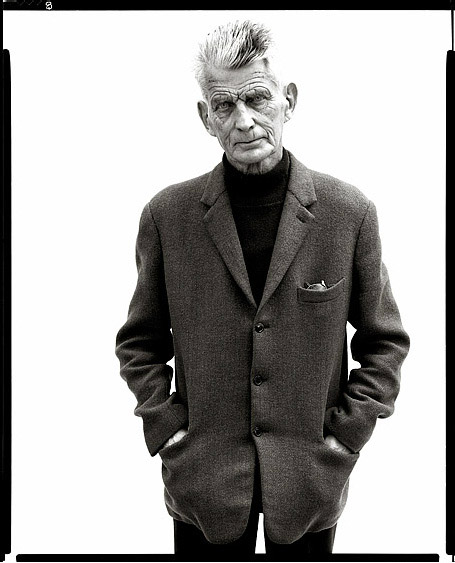Ranked 104th in the list of the most highlighted passages on Amazon's Kindle website is a short clipping from The 4-Hour Workweek by Timothy Ferris: “ ‘Ever tried. Ever failed. No matter. Try again. Fail again. Fail better.’ You won’t believe what you can accomplish by attempting the impossible with the courage to repeatedly fail better.”
The first half, of course, is a quotation from Samuel Beckett's Worstward Ho (1983), and it must have struck a chord with Ferris’s readers. But for some reason, Ferris fails to take the opportunity to allude to Beckett anywhere else in his million-selling guide on “How to Escape 9-5, Live Anywhere, and Join the New Rich.”
What a missed opportunity! There's so much more Beckett prose that's totally appropriate to co-opt in a self-help book. How about, “Is not a uniform suffering preferable to one which, by its ups and downs, is liable at certain moments to encourage that view that perhaps after all it is not eternal?” That's a useful one! Or even: “For me there have always been two fools, among others, one asking nothing better than to stay where he is and the other imagining that life might be slightly less horrible a little further on.”
Hard as it might be to accept, none of Beckett's work is ever going to reach even one tenth as many people as this little crumb of Worstward Ho taken out of context. Not Waiting for Godot, not Endgame, not the trilogy, not How It Is. “Fail again. Fail better” is on T-shirts, mousepads, mugs, and posters, including one by the same company who did “Keep Calm and Carry On.” It's been quoted (inaccurately) by Mary Louise Parker's character on Weeds. In addition to The 4-Hour Workweek, it does inspirational duty in books like What's Stopping You: Why Smart People Don't Always Reach Their Potential and How You Can, Innovation Leaders: How Senior Executives Stimulate, Steer and Sustain Innovation, and The Complete Idiot's Guide to Great Customer Service, as well as providing the title for Fail Better!: The World's Worst Marketers and What We Can Learn from Them and Epic Fail Better: How to Get Rich Off Internet Memes.
(Okay, not that last one. But there really is a Fail Better Farm in Maine that sells, among other things, organic carrots.)
"Fail better" is now experimental literature's equivalent of that famous Che Guevara photo, flayed completely of meaning and turned into a successful brand with no particular owner. Worstward Ho may be a difficult work that resists any stable interpretation, but we can at least be pretty sure that Beckett's message was a bit darker than “Just do your best and everything is sure work out all right in the end.” Yet it's only because Beckett's name is attached to the quotation and because a lot of people think of him as a sage without quite knowing what he stood for that it has spread so widely. It wouldn't have survived as an authorless proverb.
How disturbing you find this probably depends on the degree of your Beckett worship. Maybe he would have hated it if he were still alive. Or maybe he would have thought it was funny. I certainly do. Watching a liturgy from such a gloomy and merciless author getting repurposed to cheer up mid-level executives is like watching a neighbour clear out their gutters with a stick they found in the garden, not realizing the stick is in fact a human shinbone. When Beckett talks about failure, he's often talking about how language can't withstand the weight of the meaning you want to put into it, and in that sense his unintended ubiquity is ideal: What better argument for the feebleness of determinate meaning than the tawdry afterlife of “fail better”?
If you are ambivalent about Beckett's philosophical positions, this phenomenon might even be comforting. A few months ago, I decided to follow the orders of Donald Barthelme's celebrated undergraduate literature syllabus and work my way through “Beckett entire.” I've enjoyed it, but what I don't find very engaging or persuasive, especially in such huge doses, is Beckett's insistence that everything must end in darkness and deafness and decay. So I like to play a sort of existential game of paper, rock, scissors. Perhaps optimism can't hold out against pessimism, but even pessimism can't hold out against the banal, silly, tiresome but essentially well-meaning advance of the everyday platitude. There's no demonstration of life's futility or language's emptiness that is so profound, it can't one day be turned into a reassuring fridge magnet, and that thankfully helps put pessimism back in its place.
That said, I would give my full support to a law that would force anyone who's ever misused “Fail better” to read the whole of Worstward Ho a few times, plus Company and The Lost Ones for good measure. After that, we can move on to the important work of selecting a new Beckett quotation to neuter. A few paragraphs after “fail better,” we find the following:
“No choice but stand. Somehow up and stand. Somehow stand. That or groan.”
That sounds like a perfect fit for Timothy Ferris's second book, The 4-Hour Body: An Uncommon Guide to Rapid Fat-Loss, Incredible Sex, and Becoming Superhuman. Perhaps it could be the epigraph to the next edition.
